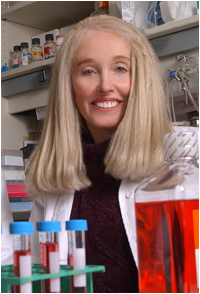 Ellen S. Vitetta, PhD, Scheryle Simmons Patigian Distinguished Professor of Cancer Immunology at the University of Texas Southwestern Medical Center, will be the next speaker in the 2010 Senior Vice Chancellor’s Laureate Lecture Series.
Ellen S. Vitetta, PhD, Scheryle Simmons Patigian Distinguished Professor of Cancer Immunology at the University of Texas Southwestern Medical Center, will be the next speaker in the 2010 Senior Vice Chancellor’s Laureate Lecture Series.
Her lecture, titled “Redesigning Nature’s Poisons for Biomedicine and Biodefense,” will focus on immunotoxin research and will take place at noon on Tuesday, June 29, in Scaife Hall, Auditorium 6.
Vitetta’s research focus is immunobiology, developing immunotoxins for the treatment of cancer, autoimmune diseases, and AIDS. Made by linking a monoclonal antibody to a chemically modified toxin, radionuclide, or cytokine, immunotoxins are capable of highly specific tumor-killing action with minimal damage to surrounding normal cells. Vitetta’s lab has engineered a variety of these antibody-based “biological missiles,” demonstrating their safety and effectiveness in tissue culture and in mice. Moving quickly from bench to bedside, several immunotoxins developed by Vitetta and colleagues are now completing Phase I and II trials in adult patients with Hodgkin’s and non-Hodgkin’s lymphoma and in pediatric patients with refractory acute lymphoblastic leukemia.
Vitetta has also applied her knowledge and expertise working with immunotoxins to biodefense research. Classified as a Centers for Disease Control “level B” biothreat, ricin is a poison naturally found in castor beans that is easily produced and is lethal at high exposure levels. There is currently no treatment or antidote for ricin poisoning. By extracting the highly toxic ricin subunit chain from the immunotoxin complex and introducing genetic modifications to render it harmless, Vitetta and colleagues developed a ricin vaccine that protected mice from ten times the lethal dose of ricin. In 2006, the group completed the first ever clinical trial of ricin vaccine in human volunteers, reporting in Proceedings of the National Academy of Sciences the vaccine’s excellent safety and immunogenicity profile. Vitetta’s ricin vaccine has since been licensed to a pharmaceutical company and is currently being evaluated by the military for use as a biological warfare deterrent.
Vitetta earned her PhD in immunology at New York University Medical School. After completing a postdoctoral fellowship there, she served briefly as assistant professor of microbiology before moving in 1974 to the University of Texas Southwestern Medical Center as an associate professor of microbiology. She has remained there since, rising through the ranks to her current positions as the Scheryle Simmons Patigian Distinguished Chair in Cancer Immunobiology, distinguished teaching professor, and director of the Cancer Immunobiology Center.
Vitetta is author or co-author of nearly 500 papers and is listed as co-inventor on more than a dozen patents. She is the recipient of numerous awards and honors, including the Lifetime Achievement Award from the American Association of Immunologists, the Women in Cancer Research Charlotte Friend Memorial Lectureship and the Richard and Hinda Rosenthal Memorial Award from the American Association of Cancer Research, and the Abbott Award in Clinical and Diagnostic Immunology from the American Society for Microbiology. Vitetta is a member of the American Academy of Arts and Sciences, the National Academy of Sciences, and the Institute of Medicine.